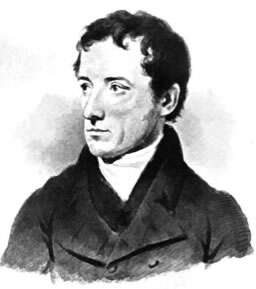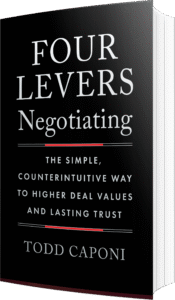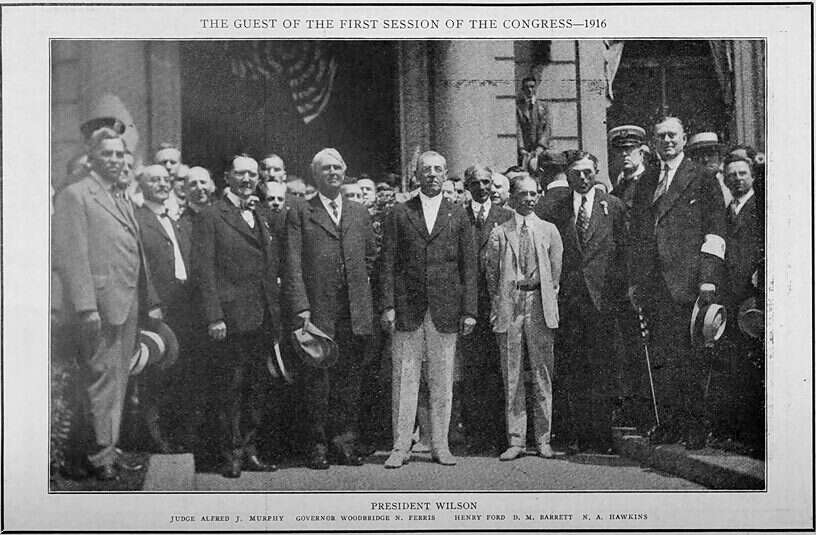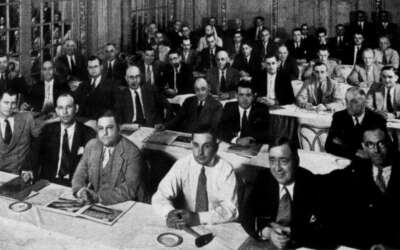Four Timeless Lessons From History’s Most Important Sales Keynote
It was July of 1916. Europe was in chaos, with much of it having just crossed over the two-year mark of World War I. Millions of young lives had been lost. The United States was certainly watching, but had not gotten involved…yet.

Part of the massive picture of attendees from the 1916 World Sales Congress in Detroit, Michigan
It was also July of 1916 that something significant was happening in the world of sales. The first World Sales Congress was taking place in Detroit, Michigan.
Attended by over 3,000 people, it was the first of its kind. But what’s even more incredible about it? The keynote speaker was then sitting President Woodrow Wilson.
While I dedicated one of the first episodes of The Sales History Podcast to this event, I decided to dig into the keynote speech itself. And while history tells us Wilson would not make any top ten lists of U.S. presidents, his speech was profound in its lessons for the sales profession.
At the time, America was industrializing at an incredible pace. It’s called the progressive era because of how manufacturing was booming, railroads and telegraphs had connected the entire country, and business leaders were thinking globally.
1) Ending Small-Minded Selling
Wilson believed, and shared in his speech, a belief that America had been “timid”.
“America, of all countries in the world, has been timid; she has raised up an extraordinary number of provincial thinkers.”
He felt as though America had a huge opportunity to become a superpower. While the rest of the world was fighting, we were building. But he felt organizations were thinking “provincially”, or in other words, local.
His message was essentially that the time for small-minded selling was over, and that the United States needed to play “a part of unprecedented opportunity and greatly increased responsibility.” Not by politicians, but by salespeople.
2) Embracing Customer-Centricity
“Hereafter, salesmanship will have to be closely related to statesmanship — to international statesmanship.”
Wilson’s message here was that the role of salespeople wasn’t just to sell things. It was basically to understand things. Become intelligent about the markets. Do better discovery. Build empathy.
He talked not about pushing harder or hustling more, but instead he said success would depend on “running your intelligence ahead of your goods.”
“If you’re going to sell carpets in India, you have got to have as good taste as the Indians in the patterns of the carpets.”
Early views on selling and serving buyers adapted to their world views.
3) The Salesperson’s Job is “Service”
Your sales kickoffs and almost every sales conference have a theme, right? The theme of this conference was one word. Service.
Legislation like the Clayton Act of 1914 was designed to limit the power of massive organizations that took advantage of the weaknesses of the Sherman Act (the anti-monopoly act of 1890). In other words, selling was no longer about dominance; it was about service.
Wilson said, “There is a great deal of cant talked about service… but it is the key to everything that concerns the peace and prosperity of the world.”
Then added, “You cannot force yourself upon anybody who is not obliged to take you.”
In other words, a lesson we all know today that has been shared for over 100 years…even by a sitting president. Force creates resistance, and true influence comes from serving.
Serving…doing the homework for the buyer. Focusing on the buyer achieving optimal outcomes, as quickly as possible, whether it’s through your solution or another. Shameless self-plug here, but that’s the core message of The Transparency Sale. It might have been interesting to have a president support my first book, right?
Wilson then used Mexico as an example of how to think about selling.
At the time, tensions were pretty high between the US and Mexico. There were quite a few that thought America should use force to help Mexico…to basically impose control.
Wilson was not interested in that idea, which may sound like it has nothing to do with sales, but then he did…and I actually love this analogy.
Wilson said, “That is the long way to help Mexico, as well as the wrong way. After the fighting, you have a nation full of justified suspicion and hostility.”
The lesson? You can’t build trust if your approach is to overpower people. You build trust by serving them.
Wilson added, “What makes Mexico suspicious of us is that she does not believe we want to serve her. She believes we want to possess her.”
What’s the perspective that the recipients of a high-pressure salesperson have? I’d argue it’s simply to replace the word “Mexico” with “your customers”.
“What makes YOUR CUSTOMERS suspicious of us is that she does not believe we want to serve her. She believes we want to possess her.”
When your approach comes across as that of self-interest, it has a scent. They can smell you wanting to possess the deal, the client, and your commission. As a result, the customer recoils.
As I’ve been screaming from the mountaintops for the past however many years, “We do not buy when we are convinced. We buy when we can predict.” Help the buyer predict, genuinely, transparency, and through the lens of service.
Amazing to me that Wilson understood that, and made it part of his keynote. Also amazing that he used international relations to make the point.
4) Being a Good Human

Charles Lamb. p.c. The Charles Lamb Society
In what is probably my favorite lesson in his keynote. It was near the end when we told a story about the English writer Charles Lamb.
“He stuttered a little bit. and he said of some one who was not present. “I h-h-hate that m-man;” and some one said, “Why, Charles, I didn’t know you knew him.” “Oh,” he said. “I-I-I don’t; I-I can’t h-hate a m-man I know.” That is a profound human remark. You can not hate a man you know.”
Hate and misunderstanding thrive when there is distance between them. That was Wilson’s point, and while it may not have much to do with sales, I’m going to remember this one.
Wilson was making a point about nations, and about people. When you actually get to know someone, and take the time to understand their point of view, it becomes impossible to hate them.
Wilson said, “As long as you do not understand a country, you cannot trade with it.”
I think it’s an incredible lesson either way. Have conversations with people, connect with them, and practice empathy. In the world of selling, how can we best build trust without empathy? Makes it a lot harder to trade with another country, but I’d argue it makes it very difficult to sell to another human being, too.
The Close
“Lift your eyes to the horizons of business. Do not look too close at the little processes with which you are concerned, but let your thoughts and imaginations run abroad throughout the whole world… and sell goods that will make the world more comfortable and more happy.”
That was from 1916. Should it not be from 2025 and beyond? What about this paragraph can someone disagree with?
The message was essentially to lift our eyes beyond the product or service we are selling, beyond our quarterly target, and beyond the commissions and bonuses we’ll receive by selling it. Stop the forcing; instead, take the time to understand your customers’ perspectives and help them achieve it. That’s service.
Woodrow Wilson’s Address to the Salesmanship Congress in Detroit, Michigan, July 10, 1916
Mr. Chairman, ladies, and gentlemen:
It is with a great deal of gratification that I find myself facing so interesting and important a company as this. You will readily understand that I have not come here to make an elaborate address, but I have come here to express my interest in the objects of this great association, and to congratulate you on the opportunities which are immediately ahead of you in handling the business of this country.
These are days of incalculable change, my fellow citizens. It is impossible for anybody to predict anything that is certain, in detail, with regard to the future cither of this country or of the world in the large movements of business; but one thing is perfectly clear, and that is that the United States will play a new part, and that it will be a part of unprecedented opportunity and of greatly increased responsibility.
The United States has had a very singular history in respect of its business relationships with the rest of the world. I have always believed, and I think you have always believed, that there is more business genius in the United States than anywhere else in the world; and yet America has apparently been afraid of touching too intimately the great processes of international exchange. America, of all countries in the world, has been timid; has not until recently, has not until within the last two or three years, provided itself with the fundamental instrumentalities for playing a large part in the trade of the world. America, which ought to have had the broadest vision of any nation, has raised up an extraordinary number of provincial thinkers, men who thought provincially about business, men who thought that the United States was not ready to take her competitive part in the struggle for the peaceful conquest of the world. For anybody who reflects philosophically upon the history of this country, that is the most amazing fact about it.
But the time for provincial thinkers has gone by. We must play a great part in the world whether we choose it or not. Do you know the significance of this single fact, that within the last year or two we have, speaking in large terms, ceased to be a debtor nation and become a creditor nation? We have more of the surplus gold of the world than we ever had before, and our business hereafter is to be to lend and to help and to promote the great peaceful enterprises of the world. We have got to finance the world in some important degree, and those who finance the world must understand it and rule it with their spirits and with their minds. We can not cabin and confine ourselves any longer, and so I said that I came here to congratulate you upon the great role that lies ahead of you to play. This is a salesmanship congress and hereafter salesmanship will have to be closely related in its outlook and scope to statesmanship to international statesmanship. It will have to be touched with an intimate comprehension of the conditions of business and enterprise throughout the round globe, because America will have to place her goods by running her intelligence ahead of her goods. No amount of mere push, no amount of mere hustling, or, to speak in the western language, no amount of mere rustling, no amount of mere active enterprise, will suffice.
There have been two ways of doing business in the world outside of the lands in which the great manufactures have been made. One has been to try to force the tastes of the manufacturing country on the country in which the markets were being sought, and the other way has been to study the tastes and needs of the countries where the. markets were being sought and suit your goods to those tastes and needs: and the latter method has beaten the former method. If you are going to sell carpets, for example, in India, you have got to have as good taste as the Indians in the patterns of the carpets, and that is going some. If you are going to sell things in tropical countries. they must, rather obviously, be different from those which you sell in cold and arctic countries. You cannot assume that the rest of the world is going to wear or use or manufacture what you wear and use and manufacture. Your raw materials must be the raw materials that they need, not the raw materials that you need. Your manufactured goods must be the manufactured goods which they desire, not those which other markets have desired. So your business will keep pace with your knowledge, not of yourself and of your manufacturing processes, but of them and of their commercial needs. That is statesmanship, because that is relating your international activities to the condition which exist in other countries.
If we can once get what some gentlemen are so loath to give us. a merchant marine! The trouble with some men is that they are slow in their minds. They do not see: they do not know the need, and they will not allow you to point it out to them. If we can once get in a position to deliver our own goods, then the goods that we have to deliver will be adjusted to the desires of those to whom we deliver them, and all the world will welcome America in the great field of commerce and manufacture.
There is a great deal of cant talked, my fellow citizens, about service. I wish the word had not been surrounded with so much sickly sentimentality, because it is a good, robust, red-blooded word, and it is the key to everything that concerns the peace and prosperity of the world. You can not force yourself upon anybody who is not obliged to take you. The only way in which you can be sure of being accepted is by being sure that you have got something to offer that is worth taking, and the only way you can be sure of that is by being sure that you wish to adapt it to the use and the service of the people to whom you are trying to sell.
I was trying to expound in another place the other day the long way and the short way to get together. The long way is to fight. I hear some gentlemen say that they want to help Mexico, and the way they propose to help her is to overwhelm her with force. That is the long way to help Mexico as well as the wrong way. After the fighting you have a nation full of justified suspicion and animated by well-founded hostility and hatred, and then will you help them? Then will you establish cordial business relationships with them? Then will you go in as neighbors and enjoy their confidence? On the contrary, you will have shut every door as if it were of steel against you. What makes Mexico suspicious of us is that she does not believe as yet that we want to serve her. She believes that we want to possess her, and she has justification for the belief in the way in which some of our fellow-citizens have tried to exploit her privileges and possessions. For my part, I will not serve the ambitions of these gentlemen, but I will try to serve all America, so far as intercourse with Mexico is concerned, by trying to serve Mexico herself. There are some things that are not debatable. Of course, we have to defend our border. That goes without saying. Of course, we must make good our own sovereignty, but we must respect the sovereignty of Mexico. I am one of those—I have sometimes suspected that there were not many of them—who believe, absolutely believe, the Virginia Bill of Rights, which was the model of the old bill of rights, which says that a people has a right to do anything they please with their own country and their own government. I am old-fashioned enough to believe that, and I am going to stand by that belief. (That is for the benefit of those gentlemen who wish to butt in. )
Now, I use that as an illustration, my fellow citizens. What do we all most desire when the present tragical confusion of the world’s affairs is over? We desire permanent peace, do we not? Permanent peace can grow in only one soil. That is the soil of actual good will, and good will can not exist without mutual comprehension. Charles Lamb, the English writer, made a very delightful remark that I have long treasured in my memory. He stuttered a little bit. and he said of some one who was not present. “I h-h-hate that m-man;” and some one said, “Why, Charles, I didn’t know you knew him.” “Oh,” he said. “I-I-I don’t; I-I can’t h-hate a m-man I know.” That is a profound human remark. You can not hate a man you know. I know some rascals whom I have tried to hate. I have tried to head them off as rascals, but I have been unable to hate them. I have liked them. And so. not to compare like with unlike, in the relationship of nations with each other, many of our antagonisms are based upon misunderstandings, and as long as you do not understand a country you can not trade with it. As long as you can not take its point of view you can not commend your goods to its purchase. As long as you go to it with a supercilious air, for example, and patronize it. as we have tried to do in some less developed countries, and tell them that this is what they ought to want whether they want it or not. you can not do business with them. You have got to approach them just as you really ought to approach all matters of human relationship.
Those people who give their money to philanthropy, for example, but can not for the life of them see from the point of view of those for whose benefit they are giving the money are not philanthropists. They endow and promote philanthropy, but you can not be a philanthropist unless you love all sorts and conditions of men. The great barrier in this world, I have sometimes thought, is not the barrier of principle, but the barrier of taste. Certain classes of society find certain other classes of society distasteful to them. They do not like the way they dress. They do not like the infrequency with which they bathe. They do not like to consort with them under the conditions under which they live. and. therefore, they stand at a distance from them, and it is impossible for them to serve them. They do not understand them and do not feel that common pulse of humanity and that common school of experience which is the only thing that binds us together and educates us in the same fashion.
This, then, my friends, is the simple message that I bring you. Lift your eyes to the horizons of business: do not look too close at the little processes with which you are concerned, but let your thoughts and your imaginations run abroad throughout the whole world, and with the. inspiration of the thought that you are Americans and are meant to carry liberty and justice and the principles of humanity wherever you go, go out and sell goods that will make the world more comfortable and more happy, and convert them to the principles of America.

I’m Todd Caponi, CSP®. (<– links to LinkedIn)
I’ve written three books so far, The Transparency Sale, The Transparent Sales Leader, and my soon to be released Four Levers Negotiating.
I’m a sales keynote speaker and sales trainer, focused on teaching revenue organizations how to leverage transparency and decision science to maximize their revenue capacity.
It’s what I do…teach sellers, their leaders, well…entire revenue organizations how we as human beings make decisions, then how to use that knowledge for good (not evil) in their messaging (informal and formal), sales negotiations, sales presentations, and revenue leadership.
Reach out (email to info@toddcaponi.com) – for inquiries about speaking at your event or sales kickoff, for programs to upskill your customer-facing teams and leaders, or just to nerd out on sales or sales history.
- Sign up for the newsletter, which comes out every other week.
- Sign up to get on the launch list for Four Levers Negotiating.
- Pre-Order Four Levers Negotiating right now (releases January 27th, 2026), or reach out for bulk orders (> 10)





0 Comments